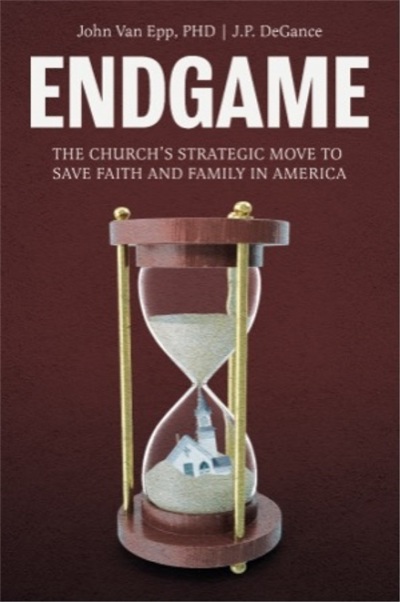Churches key to advancing ‘next Great Awakening’ by fixing broken families, marriage experts say

For years, Duval County, Florida, and its biggest city, Jacksonville, were known for having among the highest divorce rates in the state. And then something happened.
Various faith-based groups, including the Culture of Freedom Initiative, now called Communio, coordinated efforts with dozens of local churches to try and counter the tide of failed marriages.
The results were telling: From 2015 to 2017, Duval County saw its divorce rate drop by 28% and Jacksonville saw a 24% drop in its divorce rate.
Now Communio President J.P. De Gance wants to expand the initiative to help kickstart "the next Great Awakening in our country" by joining professional counselor John Van Epp, developer of the Relational Attachment Model series, to champion stable homes and families nationwide.
De Gance and Van Epp have come together to author the book, Endgame: The Church's Strategic Move to Save Faith and Family in America (released on Sept. 6).
According to the authors, the way to save the declining American family is to have churches across the country more actively pursue family and relationship ministries.
"The message of the book is simply this,” they write. “Churches in America have the opportunity and responsibility to build relationship ministries and outreaches into their congregations and communities — congruent with their faith — that speak to the needs of singles, couples, and families, and, as a result, will grow their churches and transform their communities."
The Christian Post interviewed Gance and Van Epp about their new book, including topics regarding how broken families are the leading reason why churches are in decline, why the Church is key to reviving the family unit, and advice to pastors on how to make sure their family ministries are strong. The following is an edited transcript from that interview:
CP: Why did you decide to write this book?
Van Epp: Both of us have a history of working with organizations in the community marriage movement, so nonprofits. Churches were not directly involved, per se.
A lot of times, faith-based people were working with nonprofits to try to impact their communities to lower divorce rates, improve quality of relationships in general, and almost all were doing it with government funds. And we both had different involvement.
Our frustration with all of that was as much good as it could accomplish, it never could change mainstream trends. And we came to believe, independent of each other, that it's only, truly the Church in America that has the potential, the opportunity, and we believe the responsibility, to truly impact marriage and family trends, and dating trends, especially.
Not only among their people, but to reach out into the community and to step off the campus and into the community to build a relationship and offer that kind of content that will then warm people up to the Gospel of Jesus, but will also truly impact trends that are ultimately eroding the transmission of faith in America. So we believe the breakdown of the family is breaking down faith in America as well.
De Gance: My work before connecting with John was a combination of working with nonprofits that were secular and faith-based, but then we also did end up working with churches.
This is with our work in Jacksonville, Florida, which lowered the divorce rate substantially, and it was through trial and error that we recognized “wow, the church can be a huge change agent for marriage.” Not only because the church can affect its own membership, but we recognize that churches had the power to affect the community in a way that other NGOs can't.
We recognized churches have the ability to affect their membership, we also realize that they can go way outside of their membership and affect their community, inviting folks in.
We need to have a call to action for the church to save the family.
CP: In the book, you wrote, "I had come to Washington to help save the country. But what if the best way for me to contribute to 'saving the country' didn't involve Washington at all?" Do you believe too many people focus too much on using the federal government to change the country, and not enough on other ways?

De Gance: Yes, absolutely. We have gotten away from our Tocquevillian past where problems were solved by voluntary civil society, by men and women working in their own communities, working through their churches to change real outcomes.
While politics is very important — I'm not dismissing it as important, and politics can change the culture, there have been examples of that — too many times, people of faith conclude that the best way to do it is “there ought to be a law” or “let's come to Washington and lobby for changes,” when there's a lot of work we can do, without getting anybody's permission, right now, working in our church, working in our community.
Van Epp: Our government and our Constitution, we believe in separation of church and state, but some of what is happening in relationships, or you might even say a lot of what goes on in relationships, does have a true spiritual dimension.
The Church needs to speak to both the practical skill side of how to build and maintain relationships in healthy ways. So they need to have that kind of well-rounded understanding, but they bring to it the values, the consistent values of faith and a spiritual dimension that truly brings ultimate fulfillment in whether its romantic dating relationships, or ultimately marriage and family relationships, and that's something that our government really can't do.
If we become too dependent on [the government], which we believe is what has happened and we shirk our responsibility, then ultimately, the trends will not stay consistent with faith values and will head toward unhealthy, which is definitely what has happened in America.
CP: You argued in the book that the "collapse of the family is the major driver of the decline of Christianity." Some say that things like the occasional major Church scandal or secular public education curriculums are the major drivers of Christianity declining in America. Why do you believe is the decline of the family instead of those other commonly claimed factors?
De Gance: This is a big challenge with polling organizations who try to understand the reason why faith is declining by just simply asking people, “Hey, why don't you go to church?”
The way surveys are drawn up, the respondents will give a left brain rationalization as to why they don't do something. You got to dig deeper to get the underlying emotional cause of it.
We show that once you control for family structure, if you look at a millennial, and you look at a baby boomer, they go to church at almost the exact same rate. If I know one thing about both people, it’s that if they grew up in a home of continuously married parents, there's almost no difference whatsoever.
So what that means is, if family structure was the same for millennials as baby boomers enjoyed, then millennials would be going to church as frequently as baby boomers. And, to me, family of origin just settles any questions on correlation and causation.
The data overwhelmingly shows that church attendance varies significantly based on family structure, it’s the family structure that's changed over the last 60 years and most folks who are trying to solve the problem of faith, are focusing on what we call “the smoke.” The symptom of the fire, the real fire is in the collapse of marriage and the home.
Van Epp: Look at how much money is spent on youth ministry. Because you think, “Hey, if we really just focus on this generation of young people growing up and really impact them, then we're going to change the trajectory of their life because we're going to infuse in them faith and faith values.”
And yet, with all of the emphasis of anywhere from $2 billion at a minimum, to up to maybe $6 billion a year spent on the youth industrial complex, from Christian college campuses, Cru and Navigators and InterVarsity, all the way down to staffing and churches, and look at that, it didn't seem to make a dent in the trend line of each generation, from the baby boomers to the present, each generation moving by about a 10 percent increase away from faith, becoming more religious nones.
So we're not trying to criticize investment in the youth, but point out that that was not correcting the problem. And what JP just mentioned, by just keeping the family, the parents married, and a young person growing up in an intact family, you have no decrease over the last three generations, you have no decrease in involvement in church. So therefore, that family structure seems to be the transmission belt of faith.
We have several chapters we call “the decoupling effect.” … Marriage was really viewed as a package deal socially, and what was coupled to marriage was sex, life partnership and parenting.
Of course, all through history, somebody had sex, a baby or partnership outside of marriage. But socially, it wasn't until the '60s decoupled those three things and they became really viewed as not only independent of marriage but personal rights."
Fatherlessness also is highly related to the breakdown, the erosion of the transmission of faith.
De Gance: There's significant evidence that the inability to attach to a father is a huge ingredient to expressions of agnosticism and atheism.
So we start to track that those young adults in our research with the right brain people, who said they reported being the most emotionally unattached or uninterested in church, also overwhelmingly reported having something other than a good relationship with their father.
While we all know there are good single dads or unmarried dads that are out there, on the aggregate, statistically speaking, an unmarried father is generally an uninvolved father and an unattached father. And that might be the secret ingredient as to why the collapse of marriage is destroying fatherhood, which is destroying faith.
CP: You noted in the book that while most pastors believe their churches have a strong family ministry, few actually do. What are some of the warning signs for pastors that they do not, in fact, have a strong family ministry at their church?

De Gance: First is, do you have a skills-based ministry where people are taught the skills to have a good marriage and good relationship and that those skills are practiced?
So a lot of times churches and pastors confuse preaching and teaching with practice.
Is your relationship and marriage ministry exclusively wrapped up in sermons or in just a witness talk or are you giving people the chance to practice the interpersonal skills that make marriages flourish?
[Often, churches have] the virtue of marriage down. They hold up marriage, they might champion marriage, in basic teaching, but the skills of marriage are non-existent. There's almost this idea that faithfulness to the Gospel just begets great marriage skills and the reality is, as John noted, the decoupling effect over the last 60 years has created a lot of wounds in our culture and in our hearts and in our families.
And it’s more important than ever that the Church is teaching the skills to have a great relationship. Helping singles discern a good spouse, a good partner, to have the right cadence of relationship so that they can move into a healthy marriage. It’s so important for them — those who are married — early in their marriage to be taught and to practice the skills to have a good marriage.
The reality is, is the ingredients for a great marriage and a great relationship are known and knowable and are able for all of us to practice.
So if I am talking to a pastor, I would ask the question, “how are you helping your people know the skills of relationship health and practice them on a regular basis?"
Van Epp: Very simply, what JP just said, I would add that I have a relationship series that actually involves sermons. It's a six-week series. It's described in the book as called The RAM series, but churches license it, they get it, and they do it, and it has sermons, but it also involves everybody in the church.
However, I do think a lot of lead pastors lean a little bit toward being what I call “series junkies.” So once you do a really great series, as soon as you're done, or even before you're done, the big question is, “OK, what's the next big series we want to do?” And they just bounce off of one. So a lot of churches do something about relationships, and then leave it.
So a real warning sign is, is healthy dating, healthy marriage content and skills-based content, part of your ongoing calendar every year?
Let's look at the real practical side of things, let's look at money. Does your budget have any money that is allocated on a consistent basis every year to marriage ministry and to help the singles with their dating relationships?
Because we've got to go upstream and help people long before they actually get married. And we're not just talking money for the youth, let’s put that aside. We're talking specifically for adult single dating and marriage family ministry. Is there really money in the budget?
Your wallet talks.
De Gance: We need, as a church, to recognize that even before the pandemic, the number of people getting married every single year was down 31% since the year 2000. It's dropped 61% since the year 1970.
We can either keep doing what we've always been doing. If we do that, the last one out should turn the lights off, because that's the direction the Church is heading if we don't wrap our hands around the flight from marriage.
CP: What do you hope readers take away from you book?
Van Epp: My hope is that in reading the book or if they do the [RAM series] that it does kick off a real paradigm shift of their priorities going forward into the next 10 to 20 years.
We're not talking about something that we think can be fixed in just a couple of years. We could make a huge impact if we get lots of churches involved, in working together in a particular community, like what Jacksonville had, they had over 90 churches working in the city of Jacksonville and over a three-year period, they made a huge dent of over 23 percent drop in divorce rate. If churches really work together.
My hope for the book is that it's truly embraced by the Church in America, both Catholic and Protestant alike.
De Gance: We are not cultural fatalists. Anybody reading the book should be incredibly hopeful that healthy marriage is written into the human heart. And solutions to this are possible, and it’s the church that has the solution.
I always tell people, the fact that 85 percent of churches are spending nothing in this area is actually really great news. It means family and marriage has been in a free fall over the last 50 years and the church hasn't yet entered the ring for real battle.
If churches actually became strategic, applied best practices, and reached out to their communities to renew relationships and marriages, we could see the next Great Awakening in our country in the decades ahead. And that's what I hope pastors, and church leaders would conclude.





















